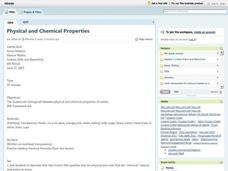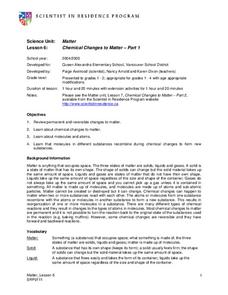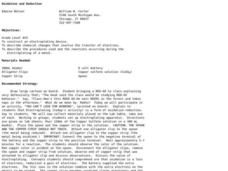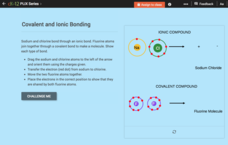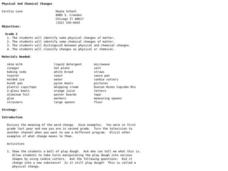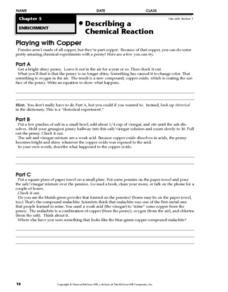Curated OER
Physical vs. Chemical
In this physical vs. chemical change activity, students answer 10 questions about identifying chemical and physical changes. They identify exothermic and endothermic reactions and the parts of a chemical equation. Students answer 1...
Curated OER
Physical and Chemical Properties
Students study the difference between physical and chemical properties. They also discuss changes in matter, known as physical and chemical changes. They observe and discuss several demonstrations of both physical and chemical changes
Curated OER
Chemical Changes
Students compare types of chemical change. In this chemical reaction lesson, students use a variety of household items to investigate different types of chemical change. Students will engage in a discussion about the dangers of chemicals...
Curated OER
Ice Cream Chemical and Physical Changes
Fourth graders identify characteristics of a simple physical and chemical change. They describe objects by the properties of the materials from which they are made and that these properties can be used separate. Students describe the...
Curated OER
Matter
Students recognize that some changes to matter are reversible and some are not. In this matter lesson, students experiment a physical and chemical change. Students record experiment results in their science journals. Students act out...
Curated OER
Fizzy Pop
Fifth graders compare and identify variables that affect the rate of a chemical change using Alka-Seltzer, water, ice, and hot water. They time how long each variable takes to pop the canister into the air, and record the results on a...
Curated OER
Oxidation and Reduction
Students investigate oxidation and reduction reactions. In this oxidation and reduction lesson plan, students construct an electroplating device and perform an oxidation/ reduction reaction. Students describe the chemical changes that...
Pingry School
Qualitative Analysis of Eleven Household Chemicals
Chemical and physical properties give compounds an identity. Learners use the identity of a compound to predict what it is. By performing different tests like solubility, flame, heat, and reactions, individuals attempt to identify an...
Chicago Botanic Garden
Food for Thought: Climate Change and Trophic Cascades
Learners examines the arctic food web with a short video about polar bears and an article about bears and warming temperatures. They design an arctic food web and discuss the trophic cascade that could come from climate change.
CK-12 Foundation
Chemical Bonds: Covalent and Ionic Bonding
Get back to bonding basics. Science scholars get a chance to show what they know using a simple interactive. Pupils create models of covalent and ionic bonds before answering questions about each interaction. The resource includes a...
Curated OER
States of Matter and Chemical/Physical Changes Stations
Students break into four groups, starting at different stations. Each station should take about 10 minutes depending on prior knowledge of the topic. They then rotate when everyone is finished to the next station and discuss answers of...
Curated OER
Burning vs. Heating
Students investigate burning vs. heating and observe the differences. In this burning vs. heating lesson plan, students observe a wooden splint burning and a piece of glass tubing being heated. They answer questions to compare the two...
Curated OER
Up and Atom
"Up and Atom" is a mini-unit introducing middle-schoolers to the wonders of elements. Participants draw atom models, examine the periodic table, compare samples of metals to nonmetals, identify unknown elements, and more! The beginning...
Curated OER
Food Packaging
Students identify the functions of packaging food and how the designs work. In this food packaging instructional activity students identify the changes that occur in different types of materials.
American Chemical Society
Natural Resources and Synthetic Materials
All synthetic materials began as natural materials. An engaging lesson begins with a hands-on activity and an example of the type of research that scholars perform independently. Then pupils receive a topic and begin researching the...
American Chemical Society
From Gas to Liquid to Solid
From gas to liquid condensation to solid frost, water undergoes phase changes before students' eyes! Using ice, salt, water, and a metal can, they set up an investigation that can be used in a physical science setting, or as part of a...
Teach Engineering
Package Those Foods!
Designing the right package — it's more than a pretty picture. Challenge small groups to design a food package. They must consider the type of food they are packaging and the package's ability to control the physical and chemical changes...
American Chemical Society
Entropy and Enthalpy Changes
My room isn't messy — it's a scientific experiment in entropy! Scholars investigate entropy, enthalpy, and spontaneity through a guided procedure and set of questions. The lesson connects the Second Law of Thermodynamics, energy transfer...
CK-12 Foundation
Metamorphic Rock Classification: Changing Under Pressure
Change is coming — but how much? Geology pupils discover the transformation of metamorphic rock using a well-rounded interactive. Topics include the effects of pressure and temperature on metamorphic rock, how time factors into the...
Curated OER
Physical And Chemical Changes
Second graders identify physical and chemical changes of matter. They distinguish between physical and chemical changes. They classify changes as physical or chemical.
Curated OER
Physical Changes & Chemical Reactions
Fifth graders explore physical and chemical changes. They prepare a demonstration in which they perform an example of either a physical change or a chemical reaction.
American Chemical Society
Changing State: Evaporation
Why do experiments require a control? Guide scholars through designing an experiment to see what they can do to evaporate water faster with a lesson that stresses the importance of controlling all variables. The second activity allows...
American Chemical Society
Changing State: Freezing
There are five types of frost: ground frost, air frost, hoar frost, glaze, and rime. Scholars mix ice and salt in a metal container to observe frost forming on the outside of the can. Animations and videos enhance the learning.
Curated OER
Describing a Chemical Reaction: Playing with Copper
Three experiments involving pennies help young chemists see the chemical reactions between copper and other elements. The first experiment is rhetorical (it prompts students to leave a bright penny out for a year) but the second two...



